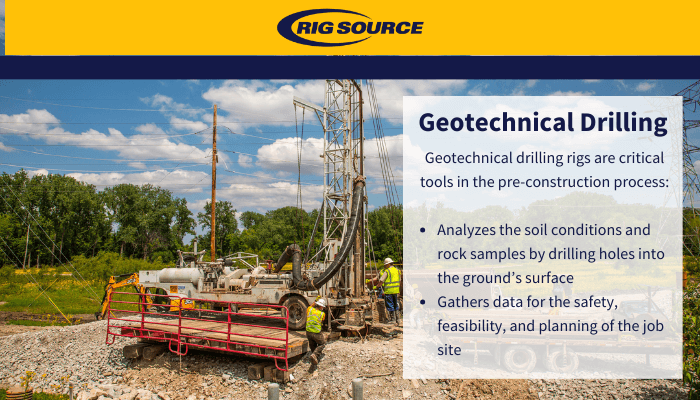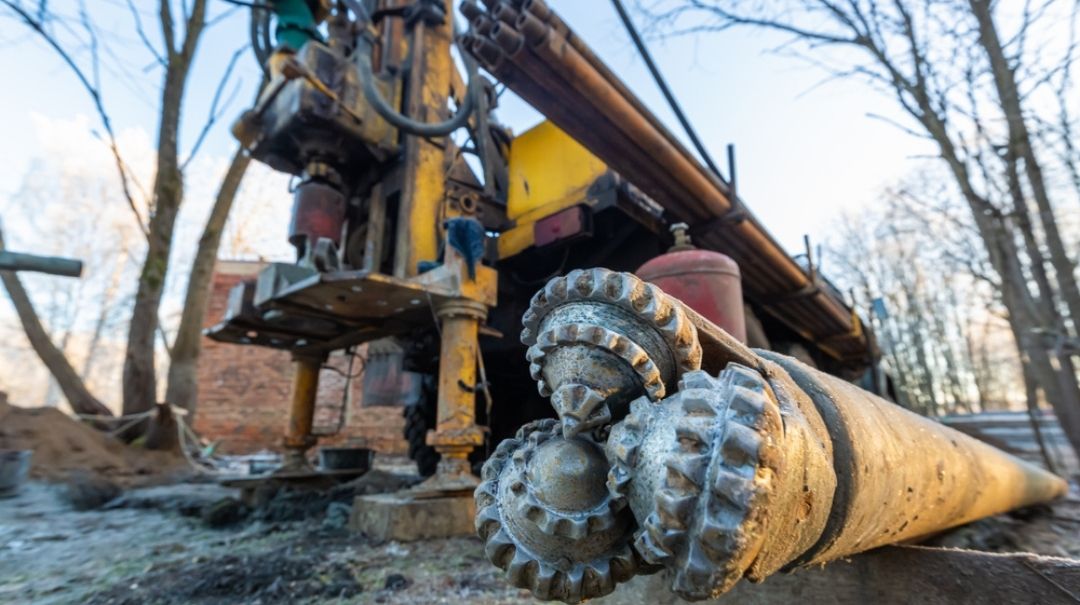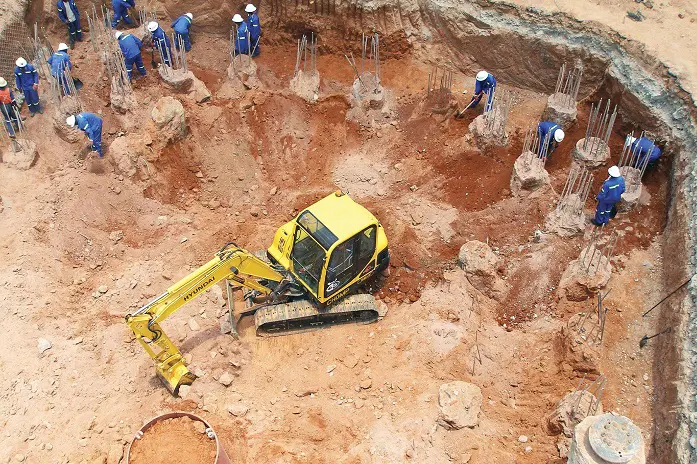Why All About Geotechnical Engineering Matters in Today's Infrastructure Development
Why All About Geotechnical Engineering Matters in Today's Infrastructure Development
Blog Article
The Significance of Geotechnical Engineering in Attending To Environmental Difficulties and Enhancing Building Security
Geotechnical design offers as a cornerstone in the junction of environmental stewardship and building and construction security, offering critical understandings into the habits of dirt and rock under different conditions. By executing calculated website examinations and customized mitigation actions, geotechnical designers play an essential role in securing both human lives and ecological stability.

Function of Geotechnical Engineering
Geotechnical engineering plays a critical duty in the layout and building and construction of framework by resolving the habits of soil and rock materials under numerous problems. This field of engineering is essential for recognizing the communication in between structures and the ground, that includes establishing the load-bearing capability of soil, assessing security, and anticipating prospective settlement or failing.
Geotechnical engineers are accountable for performing website investigations, which entail tasting and testing soil and rock to collect data on their physical and chemical residential or commercial properties. This information is essential for creating foundations, preserving walls, and other earth-retaining frameworks that make sure safety and long life. Additionally, geotechnical engineering educates the selection of ideal building and construction techniques and materials, therefore reducing threats connected with dirt habits.
Additionally, the combination of geotechnical engineering concepts right into metropolitan preparation and environmental administration is essential for attending to challenges such as ground contamination and groundwater monitoring. By understanding geotechnical aspects, designers can establish lasting solutions that enhance the durability of infrastructure against all-natural threats, while also advertising ecological stewardship. Inevitably, the function of geotechnical design is essential for accomplishing secure, durable, and environmentally mindful construction methods.
Dirt Disintegration Reduction
Dirt disintegration postures a significant risk to both environmental stability and facilities stability, influencing about 24 billion tons of productive soil lost every year worldwide. This phenomenon is worsened by variables such as logging, urbanization, and poor agricultural practices. Geotechnical design plays a pivotal role in developing reliable dirt disintegration reduction approaches that guard both the setting and building and construction tasks.
One technique involves the execution of disintegration control techniques such as plants growing, which supports soil through origin systems. In addition, the building and construction of preserving wall surfaces and balconies can properly minimize surface runoff and protect at risk locations from erosion. Proper water drainage layout is likewise essential; it minimizes water buildup and guides excess runoff far from important frameworks.
Additionally, geotechnical engineers employ dirt stablizing techniques, such as the application of geotextiles and biodegradable floor coverings, to improve dirt communication and stop degradation - geotechnical engineer description. Normal tracking and analysis of erosion-prone sites make it possible for prompt interventions, guaranteeing lasting sustainability. By incorporating these strategies, geotechnical design not just alleviates the impacts of dirt disintegration yet also adds to the resilience of framework against environmental difficulties, inevitably fostering a more secure and more lasting developed setting
Groundwater Defense Approaches
Groundwater serves as an essential resource for drinking water, farming, and commercial processes, making its security crucial for environmental sustainability and public health and wellness. Effective groundwater security methods are critical in alleviating contamination risks and making sure the long life of this resource.

Normal monitoring of groundwater top quality is likewise essential, allowing early discovery of contamination sources and assisting in timely removal efforts. Utilizing advanced innovations, such as geophysical surveys and remote noticing, help in determining possible risks to groundwater reserves.
In addition, public education and stakeholder interaction are crucial, promoting community support for groundwater defense initiatives. geotechnical specialist. By integrating governing measures, technological innovations, and community involvement, we can develop a comprehensive framework that safeguards groundwater sources while advertising lasting development and building techniques
Landslide Threat Management
Landslides present substantial threats to both human safety and security and framework, making efficient risk management methods essential. Geotechnical engineering plays a vital duty in recognizing, examining, and mitigating landslide risks. An extensive understanding of slope stability, soil auto mechanics, and hydrology is crucial for creating reliable threat monitoring strategies.
The primary step in landslide threat monitoring entails detailed website examinations, that include geological mapping and dirt screening. These investigations assist engineers assess the potential for landslides by identifying crucial elements such as slope angles, dirt make-up, and water material. Using sophisticated technologies such as remote sensing and geophysical studies can boost the accuracy of these assessments.
Once threats are recognized, get redirected here proper mitigation measures article source can be implemented. These might include engineering remedies such as preserving walls, drainage systems, and incline stablizing techniques. Checking systems must be established to detect indicators of ground motion and changes in water degrees, enabling for proactive treatments.

Enhancing Building And Construction Safety
Construction sites usually present a myriad of risks that can endanger worker security and job honesty. Geotechnical design plays a crucial role in enhancing construction safety by offering important insights right into subsurface conditions. With extensive soil and rock evaluation, geotechnical designers can determine prospective risks, such as dirt instability, groundwater issues, and seismic susceptabilities, which may compromise the safety and security of building and construction activities.
Carrying out geotechnical services, such as correct structure style and the use of preserving frameworks, mitigates these threats substantially. These services not just make certain the security of the structures being constructed but additionally create a more secure working environment for building and construction employees.
Additionally, fostering a culture of security with training and adherence to developed safety and security protocols try this web-site even more boosts construction site safety. By integrating geotechnical experience right into the preparation and implementation stages, building and construction tasks can attain greater security criteria, inevitably securing employees and making certain effective task conclusion.
Final Thought
In final thought, geotechnical engineering acts as a vital self-control in tackling environmental obstacles and advertising building and construction safety and security. With efficient soil erosion reduction, groundwater defense methods, and landslide risk management, geotechnical designers add to the development of resistant framework. The combination of these methods fosters a much safer building and construction setting and improves the sustainability of civil engineering tasks. Ultimately, the knowledge of geotechnical engineers is indispensable in securing both natural deposits and human lives versus potential dangers.
Geotechnical engineering offers as a cornerstone in the crossway of ecological stewardship and construction security, providing important insights into the actions of dirt and rock under various problems. Geotechnical design informs the selection of proper building and construction methods and products, therefore reducing dangers linked with dirt behavior.
Geotechnical engineering plays an essential duty in developing effective dirt disintegration reduction techniques that secure both the setting and building and construction projects.
Furthermore, geotechnical engineers utilize dirt stablizing strategies, such as the application of geotextiles and biodegradable mats, to improve soil communication and stop destruction. Via comprehensive soil and rock analysis, geotechnical engineers can determine prospective dangers, such as dirt instability, groundwater concerns, and seismic vulnerabilities, which may compromise the safety of construction activities.
Report this page